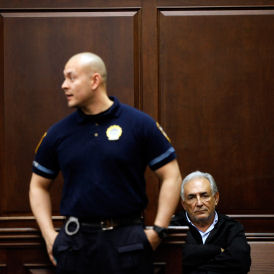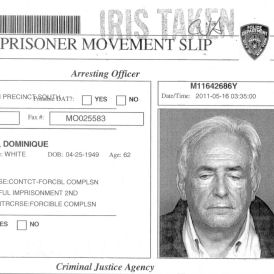Strauss-Kahn scandal ‘could change French law’
If Dominique Strauss-Kahn is found guilty, the embarrassment for France could have profound implications for the country’s attitude to privacy, a French legal expert tells Channel 4 News.

The scandal which has engulfed the former head of the International Monetary Fund (IMF), has rocked his country of origin – France – to the core.
Not only a leading international figure, Mr Strauss-Kahn was also a likely candidate in the next French presidential elections.
However, since his arrest on attempted rape charges, stories about Mr Strauss-Kahn have begun to creep out. One French journalist told Channel 4 News he was known as a “lapin chaud” – literally, hot rabbit – “an expression which means that when he sees a woman he likes to chase her”.
Obviously allegations of attempted rape are considerably more serious, but questions are being asked in France about why Mr Strauss-Kahn’s private life was not discussed more widely.
He has also been treated with media kid gloves since his arrest. Some French broadcasters have even refrained from showing images of him in custody, amid warnings from its media regulator.
No ‘kiss and tell’
At the heart of why he has been treated in this way are the stringent privacy laws in France. They stand in stark contrast to the “kiss and tell” tradition of the English media.
Dr Eva Steiner, senior lecturer in English Law and French Law at King’s College London, told Channel 4 News that articles in the French civil code prevent the media from delving too deep – notably article 9, which states: “Everyone has the right to respect for his private life.”
“French judges are very strict,” she said, “when it comes to protecting citizens, whoever they are, against the intrusions of the press in the most intimate aspects of their life.”
DSK is widely appreciated in his job as IMF boss. There was no question in the application: are you a womaniser? Journalist Thomais Papaioannou
Journalist Thomais Papaioannou told Channel 4 News the law was made by politicians, not journalists, and many would like more coverage of these kind of subjects. But she said journalists also feared that their careers could be finished if those in power did not like what they wrote.
She added that attitudes also differed – the French think if he can do the job, his private life is less important.
“DSK is widely appreciated in his job as IMF boss. There was no question in the application: are you a womaniser?” she said.
Dr Steiner agreed, saying: “The French themselves consider that what happens in the private life of politicians in nobody’s business and somebody like DSK was very well respected for his intellectual ability and political flair, although there were rumours that his private life and marriage were dysfunctional.”
Read more: Q and A on the Strauss-Kahn scandal

No handcuff pictures
Dr Steiner said media organisations were bound by another article in the civil code over what they could publish showing the alleged offender.
“Article 9.1 protects the presumption of innocence against journalists who would publish articles or pictures showing the alleged offender in a way which would make him or her a guilty person, for example a picture of the presumed offender being handcuffed,” she told Channel 4 News.
But she said the case of DSK, as he is known in France, has embarrassed France so profoundly that they may look to more scrutiny in the future.
If DSK is found guilty and is convicted, this may lead the legislature to re-think our law on privacy. Dr Eva Steiner
“I don’t think at this stage that the above will change dramatically in view of the DSK’s case. However, some in France have expressed the view that in the future it should be considered whether or not dysfunctional personalities should be allowed to hold prestigious positions. Don’t forget that the French are very embarrassed with this story.
“If DSK is found guilty and is convicted this may lead the legislature to re-think our law on privacy.”
But journalist Ms Papaioannou was not sure. She said the attitude and law in France was valuable, allowing people who had made mistakes could come back to public life because they were not destroyed in print.
She said: “The Anglo-Saxon media is very inhuman sometimes. We are all human beings, nobody is a saint. If you pay your debt to society, that’s what prison is, you are free to go back to public life – if the electorate thinks you are a good politician.”